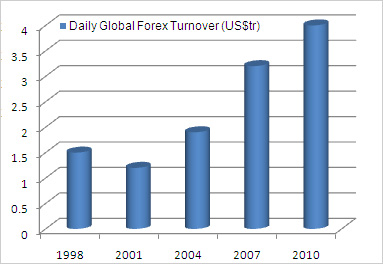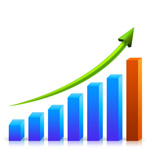What is Forex Trading
Trading in foreign exchange or currency exchange rates, (also known as FOREX or FX trading), essentially consists of speculating on the way one currency will move against another, and profiting if they move the way you predict. All currencies are traded in pairs, for example GBPUSD, (Great British Pound VS US Dollar). An FX pair is always priced in the form of how many of the second currency you can get for one of the first. So, if GBPUSD is at 1.55, this means one pound will get you 1.55 dollars. As with other products, when you trade an FX pair, you buy or sell. When you buy the pair you are speculating that the first currency will strengthen against the second and vice versa for when you sell.
FOREX is the most widely traded product in the world. From the following chart you can see that daily FX trading turnover through main exchanges as risen from around $500billion in 1988 to over $3 trillion in 2007 and it is estimated that it is nearer $4 trillion today. It is one of the fastest growing markets for retail investors globally as it is open 24 hours a day and you can profit from both rising and falling prices.

Main foreign exchange market turnover, 1998-2010, measured in trillions of USD.
How did Forex trading develop?
In 1944, the Bretton-Woods agreement was created to ensure stability of currencies by fixing gold at a rate of $35 per ounce. During this time most modern countries had gold based currencies, there was a period of stability. This system had weakness as the gold standard tended to create boom-bust economies. When an economy strengthened, the country would import heavily in order to expand. This would rapidly deplete their gold reserves and the gold was required to support their currency. The monetary supply of this country would also drop, interest rates would rise and all economic activity would dwindle or stop and threaten to put the economy into a recession.
After WWII, huge construction work was needed and a massive amount of currency trading was required to raise the capital for the work. In 1971 the Bretton-Woods agreement ended because the US dollar ceased to be exchangeable for gold. By now the forces of supply and demand controlled the currency prices of the major industrialised nations as currency was free to change hands. This encouraged larger volumes of trading and caused larger price fluctuations in a nation's currency. Finally, with globalization and the development of computers and the internet, currency trading has become even easier and more accessible to both individuals and institutions, and thus the FOREX market has grown to the $4 Trillion daily turnover we see now.
What are the characteristics of Forex trading
 The FOREX market is a very interesting and individual market; it is certainly quite different from the more traditional stock market or commodity futures markets. It is distinguished by the following traits:
The FOREX market is a very interesting and individual market; it is certainly quite different from the more traditional stock market or commodity futures markets. It is distinguished by the following traits:
Very high trading volumes
Daily turnover of $4tn dwarfs other markets.
Extremely high liquidity
It can be bought or sold very easily, very low storage costs, immediate execution, and transparent pricing etc.
Geographical dispersion
FX can be traded from anywhere in the world with an Internet connection.
Trading times
FX is traded 24 hours a day, 5 days a week, all year round. There is no dependence on seasonal factors, or future contract expiry.
What are the factors that can affect exchange rates? What should I look for when trading FOREX?
 There are a number of factors that can strengthen or weaken a country's currency, short-term or long-term. The following are considered to be major the factors that will impact the price of a nation's currency:
There are a number of factors that can strengthen or weaken a country's currency, short-term or long-term. The following are considered to be major the factors that will impact the price of a nation's currency:
Interest Rates
Typically, an increase in a country's interest rate will increase the demand for the currency, and value of its currency because ownership of this currency will provide greater returns.
Government Budget Deficits
A nation's currency will usually weaken as a response to widening government budget deficits, and vice versa on narrowing deficits.
Balance of Trade
The trade flow between countries illustrates the demand for goods and services, which in turn indicates demand for a country's currency to conduct trade. So an increasing balance of trade deficit will weaken the country's currency.
Inflation
Typically a currency will lose value if there is a high level of inflation in the country or if inflation levels are perceived to be rising. This is because inflation makes things more expensive and so demand for that particular currency drops. However, a currency may sometimes strengthen when inflation rises because of expectations that the central bank will raise interest rates to combat rising inflation.
Economic Growth
Reports such as GDP, employment levels and retail sales detail the levels of a country's economic growth and health. Generally, the more healthy and robust a country's economy, the better its currency will perform, and the more demand for it there will be.
Political Factors
Internal, regional and international political conditions and events can have a profound effect on currency markets. Situations such as Government upheaval, perceived fiscal behavior of the next/current ruling party, increasing tensions and risk of confrontation, either domestic or foreign, can greatly affect the strength of a nation's currency.
